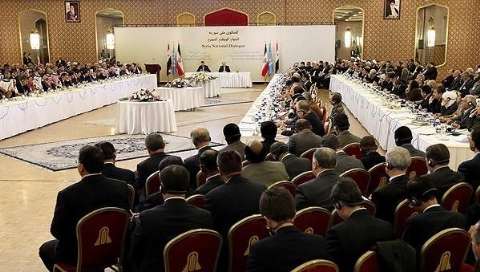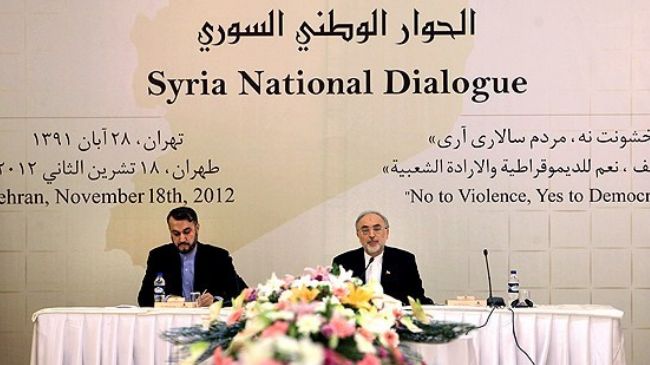“The new committee starts its work from today. From now on the Syrian delegates will be in charge of these meetings. Our goal was to help initiate a national dialogue and now it is up to them to carry on”
Yusuf Fernandez

Representatives of the Syrian government and the opposition agreed during the recent Tehran meeting to set up a committee and a contact group to help end the violence in the Arab state. Iran’s Foreign Minister Ali Akbar Salehi announced the news on the sidelines of the second day of the Syria National Dialogue meeting in Tehran. “The new committee starts its work from today. From now on the Syrian delegates will be in charge of these meetings. Our goal was to help initiate a national dialogue and now it is up to them to carry on,” Salehi said.
The two-day meeting in Tehran brought together about 200 delegates from Syria and high-ranking officials from different countries including Russia, China, Iraq, Egypt, Turkey and Jordan.
The participants condemned foreign meddling in Syria’s internal affairs as well as the Doha Conference attended by Syria’s opponents and armed groups in the Qatari capital in early November. “During the two-day meeting all parties agreed that armed conflict will not resolve the crisis in Syria. They condemned those who send arms to Syria and backed dialogue and political inclusion. I think this is a positive development,” said former Iraqi Prime Minister Ibrahim Ja'afari.
War messages from Doha
The positive results of the Tehran meeting must be considered to be in full contrast with the war messages coming from the previous Doha meeting, in which only the radical opposition was present. The sponsors of the Syrian violent opposition groups organized the much-publicized meeting in order to give a false image of unity among these groups, which have been –and remain so- deeply divided. The meeting led to the creation of the “Syrian National Coalition of the forces of the opposition and the revolution” (SNCROF), whose declared goal was to remplace the Syrian National Council (SNC), which had become completely discredited both inside and outside Syria.
Actually, the Doha meeting began in disarray, following the demand by US Secretary of State Hillary Clinton for a change within the SNC. Clinton declared that this body, formed barely a year before and recognized by Washington as the “legitimate representative” of the Syrian people, had lost Washington´s support. She dismissed the leadership that the United States had previously backed as a gang of irrelevant exiles who had not lived in Syria for decades and insisted that the US Administration wanted a leadership that was connected with those who were “fighting and dying” on the ground.
The SNC was then submitted to intense pressure from the US government in order to transfer his role and “legitimacy” to the new National Coalition. For long, the SNC resisted those attempts and elected another leader, George Sabra, a Christian, in an attempt to dismiss the allegations of sectarianism which had been floating over the members of the SNC exiled in Turkey for almost two years. Finally, they did not have a choice and bowed to Clinton´s wishes.
Clinton´s announcement apparently took the US´s allies by surprise. “The US government gave no advance notice of its intention to renounce the council as the lead umbrella group, diplomats of three countries said,” McClatchy Newspapers reported. “They said their governments learned about the initiative from news accounts.” One Western diplomat cited by McClatchy questioned the wisdom of Clinton´s remarks about including some individuals and organizations in the new leadership. “Syrians will say the Americans are imposing the names. And I am not sure the Americans would propose the right people.”
The Doha meeting was completely paid by the Emirate of Qatar, which has become –along with Saudi Arabia- the main sponsor of terrorist groups and activities in Syria. Some columnists claim that the tenure was further evidence that the al-Thani dinasty is willing to take over Syria by funding the opposition groups like it tried to do previously in Libya.
However and despite all Western media´s fanfare, the new coalition is scarcely more representative than the old SNC. The new president of the SNCROF, Sheikh Khatib, a Sunni religious leader is being sold as a “moderate” Islamist. Actually, he represents the movement of the Muslim Brotherhood, which has become the backbone of the exiled opposition.
He is accompanied by two vice presidents: Atassi Jalid, a member of the local coordination committees, which organize the armed opposition in some Syrian cities, and Riad Seif, a former member of the Syrian Parlament and businessman. He is also a known confidante of the US embassy in Damascus. Its general secretary is Moustafa al-Sabagh, who was chairman of the Syrian Business Forum, a front of exiled Syrian capitalists that offered to join Qatar and Saudi Arabia in paying salaries to the Syrian “rebels.” There is little evidence that any of them have a base of popular support inside Syria.
Actually, the results of the Doha meeting made it clear that the US was seeking a “respectable” leadership, with representatives from the various religious and ethnic groups that comprise the Syrian population, in order to better mask the bitter sectarian character of the conflict that Washington is fuelling, as well as the increasingly prominent role played by extremist militias with connections to Al Qaeda.
Among the “principles” agreed to by those forming the new coalition is a commitment “not to take part in any dialogue or negotiations with the regime” in Damascus. This represents a direct US repudiation of the UN-brokered agreement reached in Geneva last June in which Washington committed itself to supporting “peaceful dialogue and negotiation” to bring an end to the civil war in Syria and a transition to a new constitutional order.
Despite all this, the new “coalition” has little authority over the Free Syrian Army (FSA) and even less over the Salafist or jihadist groups operating inside the country. Fourteen groups of the most radical opposition announced in a video statement aired on November 19, their rejection of the program and men of the Gulf and West-led opposition. Among these organisations, which are represented on the video by about 30 men in fatigues, were the now famous Front al-Dhanub and Brigade al-Tawheed. “We, the combatant factions on the ground of the city of Aleppo and its province, announce our rejection of the plot that represents what is called the National Coalition”, they said.
On November 21, rebel groups in the northern Syria city of Aleppo also refused to recognize the Western-backed opposition coalition. On a video released on the Internet that day, the insurgents condemned the SNCROF as “a conspiratorial project.”
